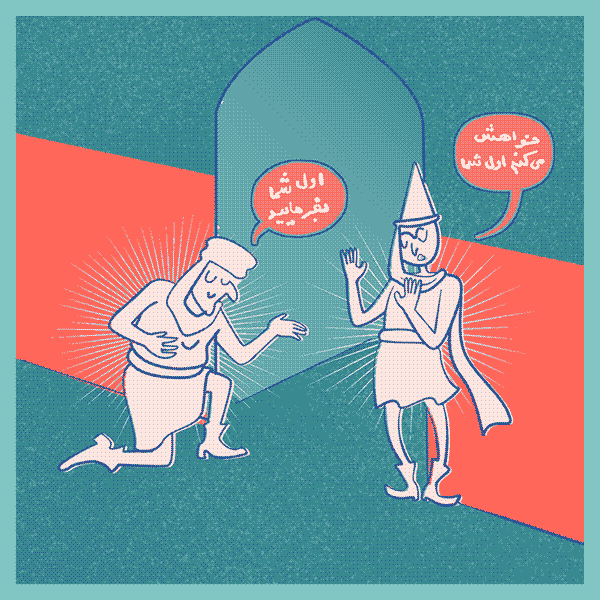What is Taarof?

تعارف
(C1 مُناسب برایِ فارسی آموزانِ سَطح)
در فَرهَنگِ ایرانی، نشان دادنِ اَدب و اِحترام در بَرخورد با دیگران بسیار مهم است. گاهی، یا شاید بهتر باشد بگویم هَمیشه، مردمِ ایران، این احترام را با چیزی به نام «تَعارُف» نشان میدهند. تَعارُف در تمامِ تَعامُلاتِ اجتماعیِ ایرانیها نَقشِ پُررَنگی دارد. پَس برای زبانآموزِ فارسی مهم است که با تَعارُف آشنا شود و شکلهای مُختَلِفِ آن و شیوهی استفادهاش را بیاموزد.
Taarof
(Farsi Level: C1)
Iranian culture values showing respect and being hospitable in all social interactions. In Iran, people show respect by practicing “Ta’arof.” This tradition is deeply rooted in their customs and is an essential aspect of their culture. As a result, individuals who are learning the Persian language should familiarize themselves with Ta’arof and understand its various forms and applications.
واژهی تَعارُف از زبانِ عَربی به فارسی آمده است و در عَربی به معنی «آشنا شدن با کسی» است. اما در فارسی بیشتر معنیِ «رَفتارِ دوستانه، اِبرازِ مُحَبَت، خوشامدگویی، اَحوالپُرسی، هِدیه دادن و یا کاری برای کسی کردن» را دارد. اما یادتان باشد که در ایران تَعارُف شکلهایِ مُختَلف و کاربُردهای زیادی دارد. به همین دَلیل تیم فارسیموند چَندین مَقاله دربارهی این موضوع برای کمک به فارسیآموزان آماده کرده است.
The word “Ta’arof” has Arabic etymology. In Arabic, it means “getting acquainted with someone.” In Persian, it represents friendly behavior, such as expressing affection, welcoming, checking up on someone, giving gifts, or doing something for someone. However, it’s important to note that Ta’arof in Iran has various forms and extensive applications. The FarsiMonde team has prepared several articles on this topic to assist Persian learners in correctly comprehending the subject.
تَعارُف دقیقاً چه شِکلی است؟
تَعارُف خودش را هم در سُخَن نشان میدهد هم در رَفتار. در گُفتار مثل این موارد:
What exactly is “Ta’arof”?
Ta’arof manifests itself both in speech and behavior. In speech, expressions such as:
قابِلِت رو نداره | qâbelet ro nadâre(h)
وقتی قیمت چیزی را میپرسیم. به معنی اینکه میتوانید این را به عُنوان هِدیه از من بِپذیرید. در این زمان معمولاً میگوییم: «قابلت رو نداره» که به معنی این است که آن چیز در برابر شما بیارزش است.
When someone asks for the price of something, the answer may be: «قابلت رو نداره!» Which can be roughly equivalent to the idiom “It’s not worth your while.”
صفا آوردین | safâ âvordin
وقتی مهمانِ ایرانیها هستید. این عِبارَت نشان میدهد که ایرانیها از آمدنتان بسیار خوشحال هستند و با آغوش باز خوشامد آنها خواهید بود.
As a guest in Iran, you may often hear the phrase “صفا آوردین”. Although we can translate it to “You brought purity”, its correct meaning is a warm welcome extended with open arms.
قُربانِ شما | qorbân-e šomâ
اگرچه تا حد زیادی اغراق آمیز به نظر میرسد، اما عبارتِ «قُربانِ شما» برای ابراز مُحبّت بسیار بهکار بُرده میشود.
“I wish to sacrifice myself for your desire”. While it might seem slightly exaggerated, it’s commonly employed to convey affection.
اختیار دارین | extiyâr dârin
در جوابِ تَشَکُر یا عُذرخواهی گفته میشود: اختیار دارین! این یعنی شما خودتان مالِک و اِختیاردار هستید.
Literary it means: “You have the choice”, in response to thanks or apologies. “I defer to you” can be considered a relative equivalent to the phrase “اختیار دارین”.
عرض کنم خدمتتان | 'arz konam xedmatetân
برای آغاز کردن گفتگو به جای «میخواستم بگم».
It’s a respectful way of saying: “I wanted to say that …”
ایرانیها گاهی تَعارُف را با رفتارِ خود هم نشان میدهند. مثلاً ایرانیها وقتی در یک جمع میخواهند غذا بخورند یا نوشیدنی بنوشَند، به افرادِ حاضر در جمع تَعارُف میکنند که «بفرمایین شما هم مِیل کنین.» یعنی ممکن است شما در اتوبوس یا قَطار با یک غَریبه همسَفر شوید، و او به شما خوراکی یا نوشیدنی تَعارُف کنید. اصلاً نگران نشوید، ایرانیها مُحَبَتِ خود را اینگونه نشان میدَهند. میتَوانید این خوراکی را قَبول کنید یا با گفتنِ «نوش جونتون، من مِیل ندارم»، از او تَشَکُر کنید.
Iranians sometimes show “Ta’arof” through their behavior as well. For example, when they want to eat or drink at a gathering, they invite others by saying, “Please, feel free to join us.” Sometimes a stranger on a bus or train may offer you something to eat or drink as a gesture of hospitality. Don’t worry! They express their affection in this way. You can accept the offer or politely decline by saying, “Thank you, but I’m fine.”
دلیل تعارف کردن چیست؟ مگر نمیشود بدون تعارف احترام گذاشت؟
شاید در اِبتِدا تَعارُف برای مخاطبانِ غیرِایرانی قابلِ دَرک نباشد. در واقِع، بدونِ تَعارُف هم میشود به دیگران احترام گذاشت. اما مَسأله این است که مردمِ ایران احترام را تا حُدودی برابر با از خودگُذشتگی میدانند. سادهتر بخواهم بگویم یعنی آنها حاضِرند خواسته، نَفع و آرزوی خودشان را به خاطر خواسته، نَفع یا آرزوی دیگری فَدا کنند. تنها به این صورت است که اِحساس میکنند به طرفِ مُقابلِ خود اِحترام گذاشتهاند.
Why do we do Taarof? Can’t respect be shown without it?
Initially, Ta’arof may not be comprehensible to those unfamiliar with Iranian culture, immediately. We can indeed show respect without Ta’arof. What motivates Iranians to embody Ta’arof in their speech and actions lies in their perception that respect, to some extent, is synonymous with selflessness. In simpler terms, this implies their readiness to forgo their desires, advantages, and aspirations in favor of those of others. This approach is the only way they feel they have shown respect to the other party.
تَعارُف، یک فرهنگ با پیشینهی طولانی است که ریشه در مِهربانی و میل به فداکاری در مردم سرزمین ایران دارد. آنها وقتی میگویند «قابل نداره! مهمان باش» از صَمیمِ قلب قَصدِ دریافت هیچ وَجهی را ندارند. اما، اجازه بدهید «قابل ندارد» را به شکل دیگری ترجمه کنم:
«ای کاش میتوانستم کالایی را که از من خریدهای به تو هِدیه بدهم، چون تو برایم بسیار اَرزِشمَندی».
در واقع، مردم با شناختی که از یکدیگر دارند و بر اساسِ قراردادی نانوشته، میدانند که فروشنده تَعارُف میکند و خریدار حتماً بهای چیزی که خریده را پرداخت میکند. اما دوست دارند با گفتن جملات یا نشان دادن رفتارهایِ تعارفی این پیامِ پنهان را به هم مُنتَقل کنند.
Ta’arof is a deeply rooted cultural custom originating from the Iranians’ compassion and readiness to make sacrifices. When they say: “It’s not worthy, please be my guest,” They sincerely have no desire to receive payment. However, let us interpret “It’s not worthy” more precisely: “I wish I could give you what you want without any payments because you are valuable to me.”
Based on an informal agreement, either the seller or the buyer knows that the seller is performing Ta’arof, and the buyer will pay for what they purchase. However, they prefer to convey this hidden message to each other by uttering certain phrases or demonstrating Taarof’s behaviors.
خب بالاخره باید پولش را حساب کنیم یا نه؟
در مُواجِهه با فرهنگِ تَعارُف به مُرور یاد می¬گیرید که جوابهایِ مشخصی بدهید:
مثلاً: «صاحِبش قابل داره» در جواب «قابل نداره» که یعنی شما خودتان اَرزِشمَندید. یا در جوابِ افرادی که مُدام شما را به مَنزلشان دَعوت میکنند بگویید: «مُزاحم نمیشَم.» البته جملۀ آخر پیچیدگیهای بسیاری دارد و اگر در شِناختِ فرهنگ ایران تازهکارید در به کار بردن آن اِحتیاط کنید!
Alright, do we finally need to pay the bill or not?
Encountering the culture of Ta’arof, you gradually learn to give specific responses: For example, in response to “qâbel nadâre(h)” (it’s not worth it), which implies you are valuable yourself, you could reply “sâhebeš qâbel dâre(h)” (you’re the valuable one). Or, when faced with people who constantly invite you to their homes, you could say “mozâhem nemišam” (I won’t be a bother). However, this phrase carries many nuances, so if you’re new to understanding Iranian culture, be cautious about using it!
اما تا پیش از اینکه به فرهنگِ ایرانی و زبان فارسی مُسَلَط شوید میتوانید از یک دَستوراُلعَمَلِ ساده در مُواجهه با تَعارُف پِیروی کنید:
وقتی فردی در رستوران یا خریدِ چیزی با شما تَعارُف میکند مُطمئن باشید که برای میزبان فردِ ارزِشمَندی هستید، بسیار خوش آمدهاید و باعث خوشحالی میزبانِ خود هستید. به آنها نشان بدهید که قَدردانِ این اِحترام هستید و از آنها بخواهید که اجازه بدهند هزینههایتان را خودتان پَرداخت کنید.
در نَهایت، اگر باز هم با اِصرار و تَعارُف بیشتر روبرو شدید، با اِحترام بِپذیرید و از حُضور در جَمعِ ایرانی و خوراکیها و نوشیدنیهایشان لِذت بِبَرید.
But until you become familiar with Iranian culture and the Persian language, you can follow a simple guideline when dealing with Ta’arof:
When someone insists on treating you in a restaurant or during a purchase with Ta’arof, be assured that you are valued by the host, warmly welcomed, and bringing joy to them. Show appreciation for this respect and ask them to allow you to pay your expenses.
Finally, if faced with further insistence and Ta’arof, graciously accept and enjoy being in the company of Iranians, their food and beverages.


Leave A Comment